29 Aug 2014
Is My Child Addicted To Gaming?
Kids today have unprecedented access to technology and devices, which can be both positive and negative. Having access to the Internet and using tablets and smartphones can provide a wealth of educational opportunities. The dark side to all this access is the potential for obsessive behaviors. Video games and Internet gaming tend to lead to addictive-like behavior, and it can start early. If you’re wondering if your child spends too much time playing games, learn more about the potential for addiction and how to curb it.
Are Video Games Addictive?
 Experts in the field of addiction have debated the existence of so-called behavioral addictions for years and how they compare to chemical addictions. The latter refers to a “true” addiction to a mind-altering substance like alcohol or illegal drugs. A behavioral addiction is considered to occur when someone exhibits addictive behaviors with respect to anything other than drugs or alcohol. Some of the more common behavioral addictions include gambling, sex or pornography, shopping and eating. Behavioral addictions can cause similar symptoms to chemical addictions, such as withdrawal, lack of control and impulsiveness.
Experts in the field of addiction have debated the existence of so-called behavioral addictions for years and how they compare to chemical addictions. The latter refers to a “true” addiction to a mind-altering substance like alcohol or illegal drugs. A behavioral addiction is considered to occur when someone exhibits addictive behaviors with respect to anything other than drugs or alcohol. Some of the more common behavioral addictions include gambling, sex or pornography, shopping and eating. Behavioral addictions can cause similar symptoms to chemical addictions, such as withdrawal, lack of control and impulsiveness.
Internet and technology-related behavioral addictions are naturally on the rise as more people have access to the devices that enable the problem. Gaming can become a behavioral addiction, although some experts might refer to it as something different, such as Internet gaming disorder or an impulse control disorder. In fact, one study has reported that as many as one in ten children show signs of addiction when it comes to playing video games.
What Are The Signs Of A Video Game Addiction?
So how can you tell if your child is at risk or already showing signs of addictive behaviors? The main criterion is that the gaming is interfering with a child’s life. This could mean that your child’s gaming is causing his grades to deteriorate because he no longer has time to study. It could be that he spends so much time playing games that he doesn’t interact socially with his peers outside of school. It could also mean that he has damaged relationships with family members because of his habit. Other signs of addictive behavior include a preoccupation with gaming, thinking about it constantly, playing whenever possible, and feeling restless or irritable when not playing.
My Kid May Be Addicted To Gaming, Now What?
If you see signs in your child that he may be addicted to gaming, try to cut back the amount of time he spends playing. Cutting him off entirely doesn’t make sense, but you should be able to limit his time by setting certain gaming hours. It is also important that you model responsible technology use because actions speak louder than words. Insist that everyone in the family turn off devices at specific times of day, such as over dinner or when studying. Seeing everyone cut back on technology will help your child to be able to do the same.
When you try to cut back and find that your child just can’t do it, or that his responses to the limitations are irrational and severe, you may need some professional help. The addiction itself may not be the root of the problem either. Some experts have found that, as with drug and alcohol addiction, compulsive gaming often masks underlying mental health issues like depression or anxiety disorders. If you are concerned about your child’s use of video games and his overall mental health, see your pediatrician for referrals. You may have to get an evaluation and a diagnosis from an addiction specialist to truly get your child the help he needs.
28 Aug 2014
How To Make The Most Out Of Rehab
Overcoming addiction is one of the biggest challenges that many people face. With dedication, support and the treatment administered by caring professionals in a rehab facility, all addicts have the ability to get clean and to learn to stay sober over the long term. Going through a successful drug rehab program takes effort on the part of the caregivers and the addict. If you are considering getting into rehab to treat your addiction, make the most of it in order to be successful.
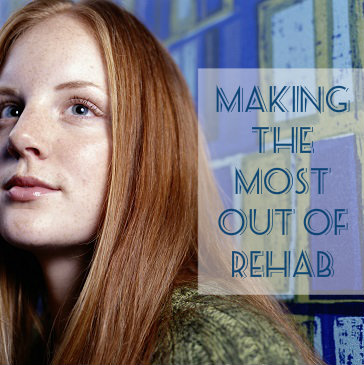 What Happens In Drug Rehab?
What Happens In Drug Rehab?
Start by learning what will happen when you enter a rehab facility. By being prepared ahead of time, you will give yourself a head start in the process of getting well. As you search for a facility for your care, hopefully with the support of a loved one, ask questions about what will happen when you enter treatment. Most likely you can expect to go through a detox and then get one-on-one counseling as well as participate in group therapy and support sessions. Beyond these basics, different facilities may use different activities and will operate based on different philosophies. Find out what those are before you start your treatment program.
Maintain A Positive Attitude While In Rehab
Going through rehab will be hard work. At times it will feel like you are failing, but when you keep your attitude positive, you will be more likely to succeed. Enter the process understanding that there will be ups and downs, but prepared to work hard for your sobriety and your healing. Remember that the first part, your detox, will be the hardest part, but that it will get easier from there. What happens during detox is that the drugs and alcohol leave your body and you feel sick as a result. When the withdrawal symptoms fade, you will be feeling better and ready to make it through your treatment.
Keep Up A Support System After Leaving Rehab
Having a support system is one of the best ways to ensure your success at getting and staying sober. No one can do this alone, and, once you leave treatment, your professional caregivers will no longer be there for you every day. Make sure you have at least one or two friends or family members willing to support you through this process. Involve these people as much as you can during rehab. If they are allowed to visit or participate, encourage them to do so. Words of encouragement for someone in rehab can make a world of difference, as can the support of loved ones afterward.
Drug rehab success rates statistics tell us that most addicts will relapse at some point after treatment. This does not mean that rehab was a failure, but it may mean that you need a tune up. Sometimes, making the most of the process means going back to try again and to get more help. Just remember to stay positive, to keep your support system around you and to not get discouraged by a small setback.
Learn More About Repairing Broken Relationships While In Rehab – Is Rehab The Time To Fix Relationships Or Just Yourself?
Call Us Now To Learn More About Drug Rehab – We Are Here For You…You Are Worth It.
Addiction impacts all aspects of a person’s life. For a drug addict or an alcoholic, life revolves around getting a fix and chasing a high. Home life and personal life are often the first to suffer while many addicts are able to keep it together at work. Eventually, however, workplace performance will begin to suffer as well. It may get to the point at which you, as a coworker, boss, or employee, begin to notice that something isn’t right. So what do you do?
What If My Boss Is Drinking Or Abusing Drugs?
 When you have a problem at work, you usually turn to your boss for help, right? So what happens when you suspect she is an alcoholic or a drug addict? First, be aware of the signs of drug abusebefore you jump to conclusions. Signs that someone is struggling with addiction usually include significant changes. You may be suspicious if your boss, who is normally reliable, has begun showing up late for work or is missing appointments. Relationships may change as well. Your boss may become more short-tempered with everyone or detached from the rest of the office if she is abusing substances. Addiction also shows up in more obvious ways, such as the smell of alcohol, signs of inebriation, bloodshot eyes and tremors.
When you have a problem at work, you usually turn to your boss for help, right? So what happens when you suspect she is an alcoholic or a drug addict? First, be aware of the signs of drug abusebefore you jump to conclusions. Signs that someone is struggling with addiction usually include significant changes. You may be suspicious if your boss, who is normally reliable, has begun showing up late for work or is missing appointments. Relationships may change as well. Your boss may become more short-tempered with everyone or detached from the rest of the office if she is abusing substances. Addiction also shows up in more obvious ways, such as the smell of alcohol, signs of inebriation, bloodshot eyes and tremors.
If you suspect your boss is abusing drugs or alcohol, you should tread carefully. The best way to try to help your boss and protect yourself is to alert human resources. Your comments will be kept confidential so that there are no repercussions for you later. You may feel like you have a good relationship with your boss and that you can approach her about this, but beware; if she does have a problem, she may be in denial and may take it out on you. Help her, but protect yourself as well.
How Do I Handle A Coworker Using Drugs?
Confronting drug abuse or excessive drinking in a coworker may be a little different than when you suspect your boss. You may feel more comfortable approaching a coworker to have a discussion about your concerns. If you have a close relationship with this person you can talk to him about your concerns. Offer your help and support and be prepared to give it. If you are not comfortable with confronting this coworker you can, as with your boss, approach human resources instead. You should never feel like you have to cover for this person’s shortcomings or be subjected to any inappropriate behavior because of his problems. Your human resource department can help you in these situations and will keep your comments in confidence.
What If I See Someone Putting Others At Risk?
If you work in a typical office setting, a coworker or boss who abuses drugs or alcohol may not cause immediate dangerous consequences. However, there are plenty of work situations in which a person under the influence could cause great harm. For instance, a doctor or nurse or someone who operates machinery could seriously injure or even kill someone while inebriated.
In these situations it is essential that you shed light on the problem immediately to avoid accidents and harm. It is your responsibility to speak up if you see a coworker or your boss putting others at risk. If you cannot confront the person yourself, tell a supervisor or human resources right away. Not only will you be preventing immediate damage, but you will also be helping the addict in the long run.
Do Some Businesses “Reward” Drug Abuse? Find Out Now!
26 Aug 2014
How Changing Marijuana Laws May Impact Children
Changing attitudes toward marijuana in society have led directly to voters changing laws in municipalities and across entire states. Nearly half of all states allow the use of marijuana for medical purposes and two allow adults to use it recreationally, even while the federal government still outlaws the drug entirely. Many people see the benefits of allowing more use of the drug (e.g., helping people with certain medical issues and increasing state revenues). Others are more worried about the unforeseen consequences, such as how greater access to marijuana will affect children.
Kids Mimic Adult Attitudes Toward Marijuana
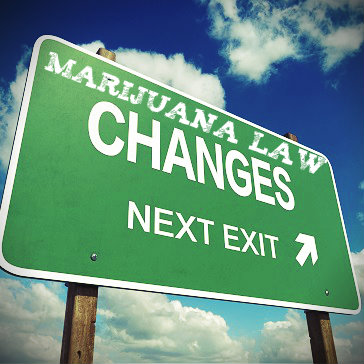 The changes in laws regarding the use of marijuana run parallel to the shift in the public’s general attitude toward this drug. Many supporters of marijuana legalization cite statistics and research that show how much safer the drug is than alcohol, a legal substance. Legalizing marijuana could make this less harmful substance as acceptable as alcohol. Many people see this as positive because it would provide tax revenue for state governments.
The changes in laws regarding the use of marijuana run parallel to the shift in the public’s general attitude toward this drug. Many supporters of marijuana legalization cite statistics and research that show how much safer the drug is than alcohol, a legal substance. Legalizing marijuana could make this less harmful substance as acceptable as alcohol. Many people see this as positive because it would provide tax revenue for state governments.
When you consider how children absorb the attitudes of the adults around them, you can understand how destructive legalized marijuana could be for young people. Most would agree that children and teens shouldn’t be allowed access to marijuana, but by sensing the lax attitude toward the drug that many adults have, young people will not take the risks of using marijuana seriously.
Alcohol, for instance, is legal for adults and considered to be socially acceptable among most people. As a result, teens use it too. Nearly half of all high school students drink, despite the negative consequences the behavior could produce. As adult attitudes toward marijuana shift to include social acceptance, you can expect teens to follow suit and begin to use the drug more often. As with alcohol, smoking marijuana is bad for teens. It affects the still-developing brain and can cause mental health issues as well as addiction.
Kids Poisoned By Marijuana
Laws giving adults greater access to marijuana mean children come into contact with the drug more than ever before. Because of this there has already been an increase in accidental ingestion by kids. Researchers found that there was a spike in visits to emergency rooms after states legalized medical marijuana and the federal government stated that it would not prosecute anyone with respect to its use for medical purposes.
One of the most common ways in which kids accidentally take in marijuana is through foods and drinks containing the drug. Such ingestions can cause children to have hallucinations, to have difficulty breathing, to lose consciousness, and even to die if the amounts are high enough or if the child isn’t treated immediately. What might be most worrisome about accidental poisonings of kids by marijuana is that it is a new phenomenon and doctors are not yet aware of all the possible harm it can cause.
Parental Neglect
Another way in which legalized marijuana, particularly for recreational use, may impact children is how parents getting high will treat their kids. Everyone knows how disruptive, and even abusive, an alcoholic parent can be to children, but what about a parent who gets hooked on using marijuana? Maybe the results would not be as devastating, but a parent who is high is not likely to do his or her job very well. Only time will tell if we see more neglect of children as marijuana use becomes legal.
Whenever laws change with respect to drugs or alcohol it is important to consider how the changes will affect young people. No matter how thoughtfully laws are crafted, or how careful adults and dispensaries are with the drug, children are bound to be impacted by increased access to marijuana.
Check Out More News On Drugs And Addiction
Buprenorphine is a drug that can be used to treat opioid addiction. It comes in two formulations called Subutex and Suboxone. Although these medications are designed and prescribed to help people overcome addiction, some people abuse them to get high. If you love someone battling opioid addiction, pay close attention and make sure he is not abusing the medication that is supposed to be helping him heal.
What Is Buprenorphine?
Buprenorphine is a synthetic opioid drug that blocks withdrawal symptoms. When the addict takes it, he can stop using heroin or painkillers without experiencing the withdrawal that leads many addicts back to substance abuse. Subutex contains buprenorphine alone and is supposed to be used first and for a short period of time. Suboxone includes a second drug, naloxone, which is intended to prevent abuse. It blocks the high that buprenorphine can impart to the user and is designed to be used after Subutex.
Can Someone Abuse Buprenorphine?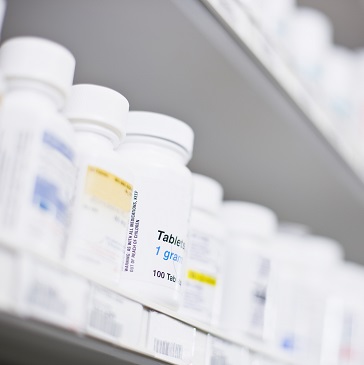
Buprenorphine was the first medication that the Food and Drug Administration allowed to be dispensed from doctors’ offices thanks to its successes in treating opioid addicts. Not all stories of buprenorphine use have been good, though. Some people have abused the medications, and although it is supposed to be impossible to overdose on, there have been deaths associated with Suboxone and Subutex abuse.
It is more difficult to get a high from buprenorphine, and also more difficult to overdose, than other opioids. It is possible, though, and some abusers are desperate enough to use this medication like an illegal drug. Dealers are making a killing selling black market buprenorphine, both to people wanting to abuse it and those wanting to use it as a treatment.
How Can I Tell Someone Is Abusing Buprenorphine?
It is important that you are vigilant with your loved one who has been prescribed buprenorphine. Not everyone realizes that there are risks associated with abusing it. Many are told that you can’t overdose on it, but this isn’t true. Make sure your loved one understands this risk and watch out for signs that he has started abusing his medication.
If you have lived with a drug addict you already know what many of the signs of abuse are. Maybe he has started:
- sleeping more
- missing days of work
- borrowing or stealing money
- having mood swings that seem inexplicable
Watch out for all the usual signs of drug abuse that you have seen before. If he starts acting like he used to when he was using, you should be concerned.
There are also specific symptoms associated with abusing buprenorphine medications. Side effects of the drugs that are possible include:
- flu-like symptoms
- sweating
- headaches
- mood swings
- nausea
- difficulty sleeping
Watch for indications that any of these are getting worse. If he is using more of the medication than directed, the side effects could be intensified. Other signs may include:
- hair loss
- emotional instability
- apathy
- a loss of interest in sex
- watery eyes
- muscle pains and cramping
- impaired memory
- depression or anxiety
Buprenorphine can be a powerful aid in helping opioid addicts get clean and stay clean, but there are risks that are often overlooked. As someone who loves an opioid addict, you should encourage him to use all the tools at hand to beat his addiction, including buprenorphine. But you should also be careful and look for signs that he has turned to his prescription medication for a high. If he has, confront him with love, understanding and patience, and help him to get back on the road to recovery.
If You Or Someone You Love Is Struggling With Addiction – Call Us Now – We Are Here For You 24/7
22 Aug 2014
Heavy Drinking Tied To Metabolic Syndrome
Metabolic syndrome is the term that doctors and public health officials use to describe a collection of health concerns that significantly increase your chances of dying from heart disease or certain other causes. While some of the risks associated with heavy alcohol consumption are well established, researchers know relatively little about the potential connection between heavy drinking and the development of this syndrome. In a study published in May 2014 in the journal Alcoholism: Clinical & Experimental Research, researchers from Japan’s Hyogo College of Medicine assessed the impact that excessive alcohol intake has on the metabolic syndrome risks of middle-aged men.
Metabolic Syndrome
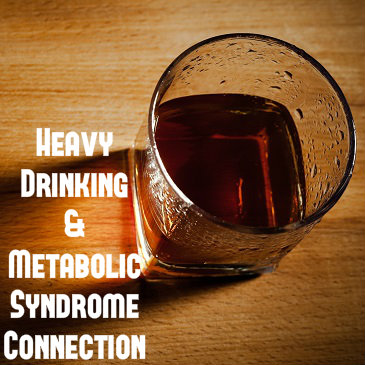 Metabolic syndrome gets its name because it involves changes in your normal metabolism, or the processing of chemical reactions inside the brain and body. Strictly speaking, the syndrome is not an illness; instead, it is a collection of risk factors for illness.
Metabolic syndrome gets its name because it involves changes in your normal metabolism, or the processing of chemical reactions inside the brain and body. Strictly speaking, the syndrome is not an illness; instead, it is a collection of risk factors for illness.
Specific factors involved in the onset of metabolic syndrome can include having a tendency to carry significant amounts of excess weight around your midsection, having a high count of a bloodborne fat called triglyceride, having low blood levels of HDL or “good” cholesterol (which removes excess LDL or “bad” cholesterol from your bloodstream), having abnormally high blood glucose or blood sugar levels and having unusually high blood pressure. As a rule, doctors consider making a diagnosis in people affected by a minimum of three of these risk factors.
Compared to the general population, a person with metabolic syndrome has a roughly 100 percent greater chance of developing some form of heart disease, the National Heart Lung and Blood Institute reports. The presence of the syndrome also increases the odds for developing type 2 diabetes by about 400 percent. Physical concerns most commonly associated with a metabolic syndrome diagnosis include maintaining a sedentary lifestyle and carrying enough body weight to qualify as overweight or obese. Other potential concerns include having an unusual resistance to the blood sugar-lowering effects of a human hormone called insulin, being older and having a genetic predisposition toward risk factors for the condition.
Excessive Or Heavy Drinking
Heavy drinking is a public health term used to describe excessive alcohol consumption on any given day or over the course of any given week. Men partake in this form of consumption when they drink more than four servings of alcohol per day or more than 14 servings per week. Women partake in heavy drinking when they consume more than three servings of alcohol per day or more than seven servings per week. Some heavy drinkers also qualify as binge drinkers by consuming enough alcohol to reach a legally intoxicated state in a single, fairly brief bout of alcohol intake. Participation in heavy drinking is conclusively linked with increased risks for developing diagnosable problems with alcohol abuse and/or alcoholism.
Examining The Connection Between Heavy Drinking And Metabolic Syndrome
In the study published in Alcoholism: Clinical & Experimental Research, the Japanese researchers used an assessment of a group of middle-aged men to compare the risks for metabolic syndrome among people in this age group who don’t drink alcohol, occasionally drink heavily and regularly drink heavily. For the purposes of the study, heavy drinking was defined as the consumption of at least 66 grams (2.3 oz) of pure alcohol on any given day when alcohol intake occurred. This is equivalent to the amount of alcohol in 3.8 standard drinks.
The researchers concluded that, compared to middle-aged men who don’t drink, men in this age group who occasionally participate in heavy drinking have a roughly 94 percent higher chance of developing metabolic syndrome. They also concluded that middle-aged men who regularly participate in heavy drinking have a roughly 48 percent higher chance of developing the syndrome. The occasional heavy drinkers are considerably more likely than their non-drinking counterparts to carry significant amounts of excess weight around their midsections. The regular heavy drinkers are considerably less likely than their non-drinking counterparts to have high blood sugar levels.
It may seem odd that occasional heavy drinkers apparently have substantially higher chances of developing metabolic syndrome than regular heavy drinkers. The study’s authors tentatively attribute this counterintuitive finding to the lowered risks for high blood sugar among people who regularly consume excessive amounts of alcohol, as well as to the increased risks for abdominal obesity among people who occasionally consume excessive amounts of alcohol. The authors also specifically note that the cardiovascular (heart and blood vessel) risks for metabolic syndrome apply to both occasional and regular heavy drinkers.
There is something about the name “synthetic marijuana” that sounds safe. If traditional marijuana is potentially dangerous with risk for abuse, not to mention illegal, certainly the synthetic should be the healthy or at least harmless alternative, right? Not so fast. Read on to educate yourself about synthetic marijuana side effects and dangers.
What Is Synthetic Marijuana?
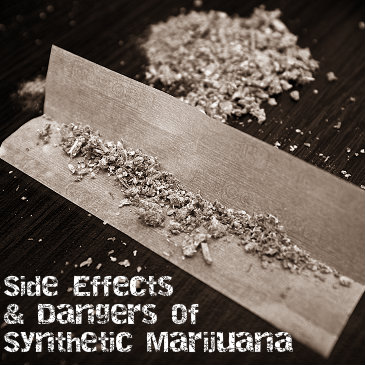 Synthetic marijuana is one substance from a family of what are known as “designer drugs.” Instead of marijuana in its natural plant form, this is a lab-created product intended to reproduce the high associated with marijuana. By creating a synthetic form of marijuana, producers, dealers and users believed they had landed on a product that would escape government sanction as well as urinalysis.
Synthetic marijuana is one substance from a family of what are known as “designer drugs.” Instead of marijuana in its natural plant form, this is a lab-created product intended to reproduce the high associated with marijuana. By creating a synthetic form of marijuana, producers, dealers and users believed they had landed on a product that would escape government sanction as well as urinalysis.
Known as K2 and spice, synthetic marijuana contains natural herbs that have been sprayed with a cannabinoid substance. While the pot-like high that the drug produces is due to the effect on the body of the same kinds of chemicals found in natural THC, it is not the same. And it is certainly not safer.
Side Effects And Dangers Of Synthetic Marijuana
The effects of synthetic marijuana will, to some degree, mimic traditional marijuana, but with some unique and often unintended consequences. For reasons not completely understood, the effect of smoking marijuana in its natural leaf form is distinct from smoking herbs sprayed with the chemicals contained within marijuana. This has led producers, users and scientists to conclude that there is more to the high and effect of traditional marijuana than the cannibinoids present in THC.
There are several synthetic marijuana dangers that users and potential users are often unaware of. Many individuals will use the drug expecting the results they are accustomed to with traditional marijuana. But with synthetic marijuana, the high is often more potent and completely unpredictable.
The side effects and dangers of synthetic marijuana that many do not anticipate, and that are rarely associated with the use of traditional marijuana, may include:
- various forms of psychosis
- hypertension
- seizures
- convulsions
- heart attack
- stroke
- blindness
- death
even in users who are young and in otherwise good health.
Synthetic weed also carries risk because of the mystery that surrounds its composition. The blend is not proprietary and each blend that a user obtains may contain any mix of unknown chemicals in unknown quantities, producing vastly different results from one high to the next. It is also especially difficult for medical professionals to treat overdoses and adverse effects given that the chemicals contained within the mixture the patient has taken may be unknown and unpredictable.
Synthetic marijuana is not a safe product and its use carries great risk. If you or someone you know struggles with addiction to synthetic marijuana or you are concerned about your use, do not delay in seeking help. Synthetic marijuana is not a harmless, legal substitute for an illegal drug; it carries dangers and side effects that may be far more severe than the drug it was designed to mimic. Withdrawal symptoms can also be powerful and unanticipated and for this reason it is recommended that users and addicts seek the care and supervision of a medical professional and/or a drug rehabilitation treatment program to safely get off and stay off synthetic marijuana.
Find Out How Synthetic Marijuana Use Is Rising Among Troops
20 Aug 2014
How To Trust An Addict In Recovery
When you have had to cope with having a loved one struggle with addiction, you learn what it means to lose faith in someone. Addicts tend to abuse the trust of those they love when they’re wrapped up in their illness. Your loved one probably used and lied to you, let you down and maybe even stole from you. Now that he is in recovery, can you ever learn to trust him again? With effort and action on both sides, you can.
What Does It Mean To Trust?
 Trust is something that is at the heart of all healthy relationships. We often think of being trustworthy as being naïve, but that is not always the case. In order to trust anyone you have to be willing to take a leap of faith. It means making yourself vulnerable and opening yourself up to the possibility of being deceived and hurt. Trusting means letting go of fear, and that is never easy, but in order to have a real and loving relationship again, you have to put that fear aside and take the plunge.
Trust is something that is at the heart of all healthy relationships. We often think of being trustworthy as being naïve, but that is not always the case. In order to trust anyone you have to be willing to take a leap of faith. It means making yourself vulnerable and opening yourself up to the possibility of being deceived and hurt. Trusting means letting go of fear, and that is never easy, but in order to have a real and loving relationship again, you have to put that fear aside and take the plunge.
Opening up and letting go of fear take on whole new meanings when your trust is being given to someone who has already proven to be untrustworthy. Every bone in your body may be screaming that you cannot trust him again; all evidence might point to him not having earned your trust, and yet you still have a choice. Moving forward means building up trust once again. Without it you remain stagnant.
What Steps Will Lead To Trust?
Regaining trust when it has been lost means taking action. Most of that action needs to come from the recovering addict. He needs to do the legwork involved in proving that he is trustworthy once again. If he doesn’t yet realize this, you must sit him down for a serious talk about trust, moving forward, and what it will take on his part to earn your trust.
The first thing your recovering addict needs to do is acknowledge the ways in which he has broken your trust in the past. Explain to him how those instances hurt you and make it difficult for you to trust him now. The next step is action-oriented. For all the actions he took to break your trust, he must now do things that prove he is trustworthy. It takes many more instances of trustworthiness to bring back trust than it took deceitful actions to break down that trust, so make sure he is prepared to be patient and to be consistent.
An addict working toward regaining trust needs to always be aware of what he is doing that either earns or further erodes your trust. With every action he takes, or inaction sometimes, he needs to remember to do what he says he will do, be accountable for what he does or what he neglects to do, and always be reliable. He should be there when you need him, with no excuses.
What Can You Do To Trust Your Recovering Addict?
Most of the action needs to come from the addict earning back trust, but you also need to take steps toward opening yourself up again. Remember to be patient and take your time. Trust doesn’t happen overnight when you have endured so much betrayal. Don’t get frustrated with yourself if you continue to question him. Also be sure to be open and honest with your loved one. Trust cannot exist without communication. If you feel he has let you down in some way, don’t sulk. Talk to him about it. When both of you actively work toward rebuilding trust, you also rebuild your relationship—and that is worth the effort.
Check Out These 4 Recommended Tips To Cope When A Loved One Goes To Rehab


